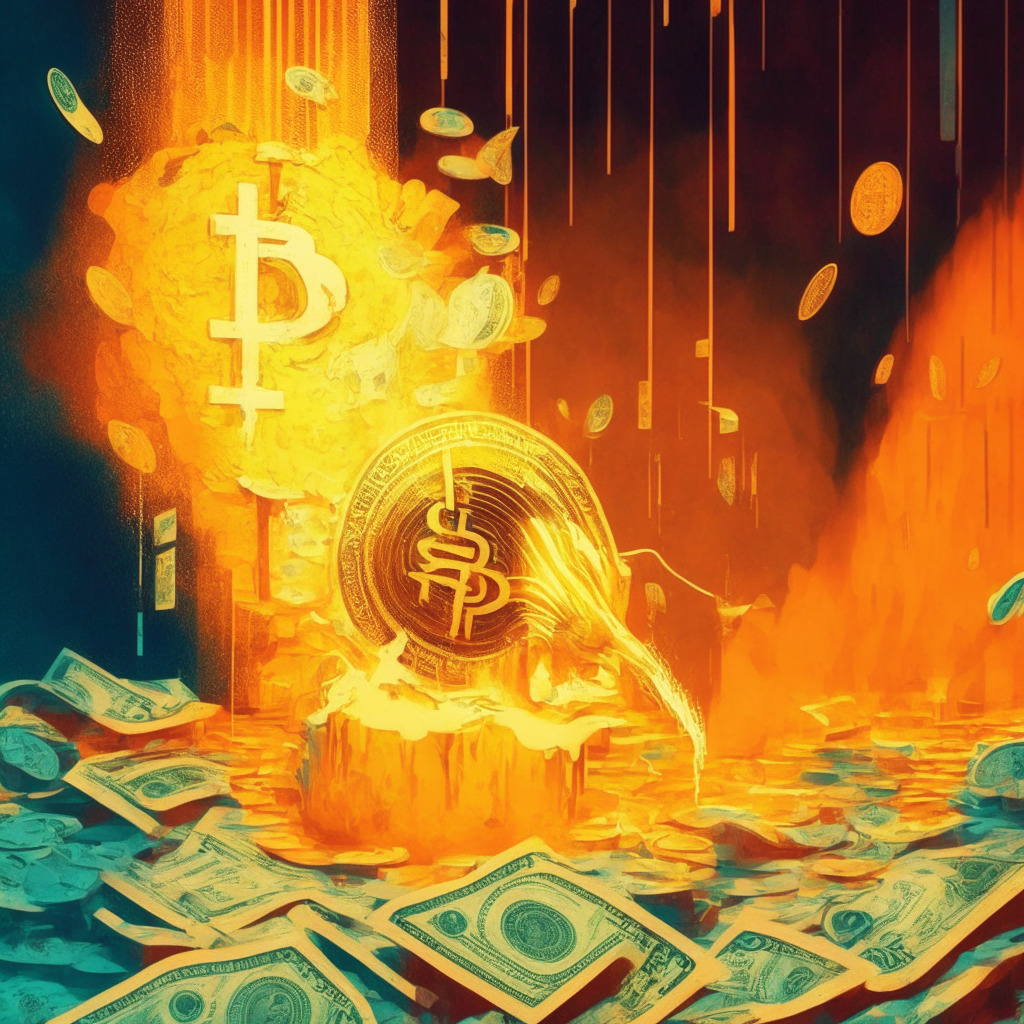“The recent price turbulence in cryptocurrency markets saw liquidations of around $256 million in just 48 hours. This frenzy originated from speculation of FTX potentially liquidating its assets, causing Bitcoin’s value drop below the $25,000 threshold, a plunge not seen since June.”
Search Results for: Virtu Financial
Canadian Leadership’s Crypto Conflicts: Unmasking the Bitcoin Irony amid Trudeau’s Warning
Despite Canadian Prime Minister Justin Trudeau’s cautionary stance on digital assets, Bitcoin demonstrated a strong performance, outperforming inflation and the S&P 500 last year. Contrary to Trudeau’s viewpoint, several Liberal MPs, including Trudeau’s opposition rivals, own virtual asset investments, signaling a division in official perspective on crypto within his own party.
Dissecting Project Sela: Orchestrating the Safe Future of Central Bank Digital Currencies
“Project Sela showcases the potential of central bank digital currencies (CBDCs), implementing a novel intermediary approach to reduce liquidity risk. Dealing with concerns about cybersecurity and privacy, it signals a future where transactions settle directly on the central bank’s ledger, inspiring global central banks’ digital transformation.”
International Success in Cryptocurrency Fraud Prevention: A Detailed Analysis
In a joint international effort, law enforcement bodies have successfully taken down a fraudulent investment scheme, BCH Global Ltd. Thai authorities and Homeland Security Investigation apprehended five individuals behind this scam, which cheated around 3,280 investors of approximately $76 million. The fraudulent scheme promised swift, substantial returns through investments in gold and digital tokens, USDT.
The Billion-Dollar Storm: Unraveling FTX’s Bankruptcy and Potential Market Impacts
Former crypto exchange FTX, currently holding around $7 billion in assets including Solana (SOL) tokens and Bitcoin, is facing major legal and financial issues. Despite controversy and potential large-scale liquidation, the company seeks to ensure creditors’ dues are paid, possibly mitigating the impact of a mass sell-off.
Crypto Error Sees Loss of $500k in BTC: A Week of Crypto Highs, Lows, and Ethical Pursuits
In a significant blockchain error, a Bitcoin user mistakenly paid a 20 BTC ($500,000) fee to move only 0.074 BTC ($200). Additionally, gaming VC firm Animoca Brands secured $20 million for the Mocaverse project, and Unstoppable Domains introduced a Business-to-User messaging feature. Meanwhile, the DOJ targets Bitcoin fraud and French regulators launch an educational module for influencers. Decentralized exchange Sushi integrated with non-Ethereum Virtual Machine chain Aptos, marking a significant step in blockchain interoperability.
Casio’s Dive into NFTs: Innovative Approach or Marketing Strategy?
“Blockchain technology has enabled a new form of virtual ownership, NFTs. Notable brands like Casio are utilizing this tech, releasing 3D model G-Shock NFTs as a novel blending of loyalty programs and blockchain. However, whether this represents innovation or a simple marketing ploy remains to be seen.”
Quantitative Easing and Crypto Interaction: Economic Savior or Inflation Nightmare?
Quantitative easing (QE) increases money supply, which may lead investors to alternative stores of value like cryptocurrencies. While not directly impacted by QE, cryptocurrencies’ values can surge due to fiat currency devaluation and lower interest rates.
Navigating Taiwan’s Unfolding Crypto Regulation: Certainty or Stifling Innovation?
“Taiwan is crafting restrictions for offshore cryptocurrency exchanges operating within its domains. The Financial Supervisory Commission (FSC) is formulating a guidebook to help virtual asset services providers establish regulatory norms, focusing on information disclosure, virtual asset listing standards, and secure division of corporate and customer assets.”
Ripple’s Strategic Acquisition of Fortress Trust: Innovation or Defensive Measure?
“Ripple’s strategic acquisition of Fortress Trust bolsters its position in the blockchain markets, adding to its portfolio of over 30 US regulatory licenses. The acquisition could serve dual purposes, expanding services and customer value while also fortifying against unpredictable US regulation.”
Navigating Web3 Opportunities: The Emergence of Blockchain Gaming in Saudi Arabia’s Vision 2030
“Saudi Arabia’s shift from an oil-dependent economy to investing in blockchain gaming and Web3 captures attention. This redraws its economic blueprint under its ambitious Vision 2030 plan. With gaming sector investments on the rise, the kingdom seeks to explore the new internet wave, potentially positioning it as a global gaming hub.”
Unraveling Taiwan’s Regulatory Moves: Balancing Crypto Boom and Security Concerns
Taiwan’s Financial Supervisory Commission plans to release guidelines for crypto companies to ensure safety and compliance with anti-money laundering laws. This move, affecting local and overseas firms, reflects Taiwan’s intent to regulate and embrace the crypto sector while balancing innovation and security.
Hong Kong’s Digital Yuan Testing Phase II: A Leap to Future or a Threat to Privacy?
“Hong Kong is advancing on the second phase of technical testing for China’s digital yuan, focusing on the digital wallet’s top-up functionality via the Faster Payment System. Concomitantly, the city grapples with challenges balancing financial innovation and consumer protection in the fast-paced digital currency landscape.”
CFTC’s DeFi Clampdown: Balancing Investor Protection and Blockchain Autonomy
The recent DeFi regulation by the U.S. Commodity Futures Trading Commission (CFTC) has stirred concerns in the crypto community. The fines and cease orders, for alleged non-compliance with registration requirements, could potentially undermine blockchain’s decentralization and autonomy, deterring innovation. Balanced regulation is necessary for investor protection and blockchain development.
Taiwan’s Crypto Regulation Tightrope: Balancing Innovation and Security
“Taiwan drafts guidelines to regulate unregistered foreign virtual asset service providers (VASPs). The Financial Supervisory Commission (FSC) produced a draft of ten principles, aiming to protect the market from abusive practices while promoting transparency and differentiating custody of assets.”
Google’s Blockchain Turnaround: The Dawn of NFT Gaming Advertisements and the Hidden Implications
Google has revised its advertising policy to permit promotion of blockchain-powered non-fungible token (NFT) games, affecting NFT games that abstain from promoting gambling content. However, it maintains its prohibition against game advertisements where players risk NFTs for earning additional digital assets.
Zodia Markets’ Leap towards OTC Crypto Broker-Dealer Status in Abu Dhabi: A New Chapter in Digital Economy
Zodia Markets, sponsored by Standard Chartered Ventures, has gained preliminary approval to operate as an over-the-counter crypto broker-dealer in Abu Dhabi. This is part of a custom-tailored approval process initiated by Abu Dhabi Global Market (ADGM), which aims to attract and regulate crypto-based businesses.
Japan’s FSA Suggests Crypto Tax Reforms: An Effort to Revitalize the Digital Asset Landscape
Japan’s top financial regulator, the Financial Services Agency (FSA), has proposed changes to the country’s tax laws regarding digital asset profits. This move aims to better align Japan’s stance on cryptocurrencies with global standards, reduce financial burdens on local businesses, and foster innovation within the blockchain industry.
Unveiling the Digital Euro: Europe’s Step Towards CBDCs and What It Means For You
ECB executive Fabio Panetta recently detailed the European Commission’s plans for a digital Euro, asserting this could establish Europe as a leader in central bank digital currencies (CBDCs). The mission focuses on safeguarding European monetary sovereignty, preserving fiscal freedom, and ensuring privacy and data security. However, concerns remain over the compatibility of a digital Euro with existing financial structures.
Boosting Web3 Startups: Cronos Lab’s Accelerator Program Amid Security Concerns
“Cronos Labs has launched a recruitment phase for its $100M accelerator program, aiming to support early-stage projects that promote the adoption of decentralized applications (DApps). However, this strategy can inadvertently lure scammers using government-owned website URLs to dupe victims and access their crypto wallet holdings.”
KEB Hana Bank Seizes Future of Blockchain with BitGo Partnership: A Dive into South Korea’s Digital Asset Market
South Korea’s KEB Hana Bank partners with BitGo, a leader in crypto custody and security, to offer digital asset custody services from 2024. The partnership is expected to enhance consumer protection and trust in South Korea’s digital asset market and improve the quality of Hana Bank’s digital asset custody operations. The collaboration also aims to capitalize on blockchain security technology, backed by BitGo’s recent funding of $100 million.
Nigeria Surpasses U.S in Crypto Knowledge and Adoption: A New Frontier or Regulatory Challenge?
The report by YouGov and ConsenSys confirms Nigeria’s emergence as a leading crypto-savvy nation, beating the US and several European countries in digital asset knowledge and intended investment interest. With a crypto awareness of 99% among Nigerians, up to 70% comprehend the value and mechanisms of blockchain technology. A significant 90% of participants expressed pan to invest in digital assets within the year, despite the national bank’s unclear stance on crypto.
Ethereum’s Co-founder Sells Remaining Stake in MakerDAO: A Signal for Blockchain’s Future?
Ethereum co-founder, Vitalik Buterin, recently traded his remaining stake in MakerDAO tokens after MakerDAO’s co-founder announced plans to reimplement the project on a new blockchain, NewChain. The move shows shifting alliances and notable developments in blockchain dynamics.
Diversifying Crypto Investments: HashKey Capital’s Novel Strategy and the Implications for Digital Assets
Hong Kong’s HashKey Group, through HashKey Capital, is taking an interesting approach with its new fund, planning to allocate less than half of its portfolio to Bitcoin and Ethereum. The strategy seems to suggest an increased focus on alternative cryptocurrencies, driven by the weaker performance of the Hong Kong stock market and the rising demand for above-market returns in cryptocurrency.
UK’s Implementation of the Crypto Travel Rule: A Double-Edged Sword?
The UK’s recent implementation of the ‘Travel Rule’ for crypto transactions aims to deter anti-money laundering and counter-terrorist financing on-chain. This rule requires UK-based virtual-asset service providers to collect, verify, and share information about crypto-asset transfers, even from overseas jurisdictions.
Navigating the Crypto Coaster: The Impact of Economic Events on Bitcoin’s Trajectory
“Bitcoin’s price fluctuates around $26,164 with a trading volume of $18 billion. Despite a recent 4% drop, Bitcoin stays unshaken at its zenith on CoinMarketCap with a live market cap of $509 billion. Watch for Bitcoin’s trajectory amid US Department of Labor’s encouraging employment figures.”
Social Media Giant X Dives into Crypto: Speculations, Implications, and the Elon Musk Factor
“Social media giant, X, has earned a regulatory license to process cryptocurrency payments in the United States, by obtaining the Rhode Island Currency Transmitter License. This move, supported by several states, strengthens X’s potential to facilitate virtual transactions, possibly expediting the mainstream adoption of digital currency.”
EOS Network’s Dramatic Turnaround: Nod from JVCEA & Promises of the Japanese Market
EOS Network, a blockchain that garnered $4 billion in its initial coin offering, has been granted white-list approval by Japan’s regulatory body for crypto exchanges. This allows EOS to compete with major cryptocurrencies like Bitcoin and Ethereum on Japan’s regulated crypto exchanges. The approval signifies EOS’s compliance commitment and opens new opportunities for the network in the Japanese market.
Swiss SEBA Bank Navigates Hong Kong’s Evolving Crypto Regulatory Landscape
The Swiss-based SEBA Bank, known for its crypto friendliness, has made a significant stride towards offering crypto services in Hong Kong, securing approval-in-principle from the city’s Securities and Futures Commission. This move reflects SEBA’s strategic push to align with Hong Kong’s evolving crypto regulations and to strengthen its regulated presence across the Asia Pacific region.
When Blockchain Meets Regulation: A Tale of NFTs, SEC and Unseen Chains
In an unprecedented move, the U.S. SEC has classified a non-fungible token (NFT) as a security, underlining the regulatory complexities as crypto technologies evolve. The incident serves as a warning to crypto projects, revealing that despite the inherent freedom within the crypto landscape, invisible chains bound them when engaging in regulated activities.
Shackles or Safeguards? Federal Reserve’s Crypto Oversight Fuels Global Expansion
The Federal Reserve’s intensified scrutiny of banks’ cryptocurrency activities has sparked criticism from Republican lawmakers who argue this deters institutions from participating in the digital asset landscape. The Fed’s new requirements may potentially suppress the progress of decentralized finance. Amidst this, U.S. regulations on digital assets remain unclear, pushing some crypto companies to explore alternative markets overseas. The discourse focuses on balancing effective supervision with fostering blockchain innovation.
Managing Events in the Metaverse: Navigating Complexity and Optimizing Potential
“The fusion of virtual reality with physical reality gives birth to the metaverse: a communal virtual space hosting augmented reality (AR), virtual reality (VR), and more. Events in the metaverse promise interactions that transcend boundaries and offer an immersive digital experience, yet pose unique complexities and risks.”































